Previous Fi Curriculum – Ch. 7
-ir verbs (irregular) like ouvrir present tense
A very limited group of verbs with infinitives ending in -ir are irregular, that is, they do not follow the pattern of regular -ir verbs like finir. Verbs like ouvrir are conjugated instead like regular –er verbs.
| ouvrir ‘to open’ | |
| j’ouvre | nous ouvrons |
| tu ouvres | vous ouvrez |
| il/elle/on ouvre | ils/elles ouvrent |
| past participle: ouvert | |
Verbs conjugated like ouvrir include:
| couvrir | to cover |
| découvrir | to discover |
| offrir | to offer, to give (a gift) |
| souffrir | to suffer |
Listen carefully to the pronunciation of the verbs in the following sentences. Note, too, that there is no s in the imperative ‘tu’ form of the second sentence, since it is conjugated like a regular -er verb in the imperative.
| Bette offre un cadeau à Tex. C’est son anniversaire aujourd’hui! | Bette is giving Tex a gift. It’s his birthday today! | |
| Bette: Ouvre le paquet, Tex! | Bette: Open the package, Tex! |
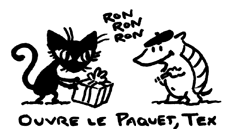 direct object pronouns
direct object pronouns
A direct object is a noun following the verb that answers the questions ‘what?’ or ‘whom?’ Remember a pronoun replaces a noun, and in this case the noun is a direct object. For example, Tammy might ask: ‘Tex, will you kiss me tonight?’, where the direct object pronoun ‘me’ stands for Tammy. Whether a verb takes a direct object or not depends on whether the specific verb is transitive or intransitive.
forms and uses
| direct object pronouns | |
| me, me | nous, we/us |
| te, you | vous, you |
| le, him/it la, her/it |
les, them (masc./fem.) |
In front of a word starting with a vowel, le and la become l’; me becomes m’; te becomes t’.
| Tammy: Dis, tu m’appelles ce soir, Tex? | Tammy: Say, will you call me tonight, Tex? | |
| Tex: Oui, ma belle, je t’appelle ce soir. | Tex: Yes, beautiful, I will call you tonight. | |
| Corey: Edouard et moi, tu nous appelles ce soir, Tex? | Corey: Edouard and me, will you call us tonight, Tex? | |
| Tex: Non, je ne vous appelle pas ce soir. | Tex: No, I will not call you guys tonight. | |
| Joe-Bob: Moi, je peux les appeler ce soir! | Joe-Bob: I can call them tonight! |
Direct object pronouns in French agree in number and gender with the nouns they replace.
| Tex cherche le numéro de téléphone de Tammy. Enfin il le trouve et il l’appelle. | Tex looks for Tammy’s phone number. Finally he finds it and he calls her. | |
| Joe-Bob cherche les numéros d’Edouard et de Corey. Enfin il les trouve et il les appelle. | Joe-Bob looks for Edouard and Corey’s phone numbers. Finally he finds them and he calls them. |
Note that le/l’ can replace an adjective or a verb.
| Tex et Tammy sont amoureux? Oui, ils le sont. | Tex and Tammy are in love? Yes, they are. | |
| Tex est quelquefois jaloux? Oui, il l’est. | Tex is sometimes jealous? Yes, he is. | |
| Joe-Bob: Tu veux que j’appelle Tammy? | Joe-Bob: Do you want me to call Tammy? | |
| Tex: Non, moi, je vais le faire. | Tex: No, I’ll do it. |
placement
Direct object pronouns precede the verb of which they are the object. In a composed tense (like the passé composé), the pronoun precedes the auxiliary. In infinitive constructions, the pronoun goes immediately before the infinitive. When the conjugated verb is negative, the ne precedes the object pronoun.
| Tammy: Tex m’aime. | Tammy: Tex loves me. | |
| Bette: Tex ne t’aime pas. | Bette: Tex does not love you. | |
| Tammy: Tex va m’épouser. | Tammy: Tex is going to marry me. | |
| Bette: Sois raisonnable, Tammy. Tex ne veut pas t’épouser. | Bette: Be reasonable, Tammy. Tex doesn’t want to marry you. | |
| Tammy: Mais si. Il l’a promis quand je l’ai rencontré à Lyon. | Tammy: Yes he does. He promised when I met him in Lyon. | |
| Bette: Mais il ne m’avait pas encore rencontrée! | Bette: But he hadn’t yet met me! |
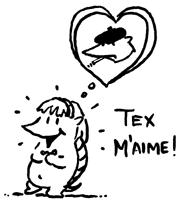
In the negative imperative, the pronoun follows the normal placement before the verb. However, in the affirmative imperative, the object pronoun goes after the verb and is attached to it by a hyphen. In addition, me and te become moi and toi.
| Bette: Tex, embrasse-moi! | Bette: Tex, kiss me! | |
| Joe-Bob: Attends, ne l’embrasse pas devant moi. Je m’en vais. | Joe-Bob: Wait, don’t kiss her in front of me. I’m leaving. | |
| Bette: Eh bien, il est parti. SMACK! | Bette: Eh bien, he’s left. SMACK! |
agreement of the past participle
The past participle agrees in gender and in number with a preceding direct object. In other words, if the direct object pronoun is feminine, add an e to the end of the past participle; if the pronoun is masculine plural, add an s (unless the past participle already ends in s); if it is feminine plural, add es.
| Un peu plus tard … | A little later … | |
| Bette: Tammy? Tu sais, Tex m’a embrassée. | Bette: Tammy? Tex kissed me. | |
| Tammy: Ce n’est pas vrai! | Tammy: That’s not true. | |
| Bette: Demande-lui. Il arrive. | Bette: Ask him. Here he comes. | |
| Tammy: Tex, tu l’as embrassée, Bette? | Tammy: Tex, did you kiss her, Bette? | |
| Tex: Qui? Bette? Mais non. Je ne l’ai pas embrassée. C’est elle qui m’a embrassé! PAF! Aie! | Tex: Who? Bette? Why no. I didn’t kiss her. She kissed me! POW! Ow! |
indirect object pronouns
forms and uses
An indirect object is a person which receives the action of a verb indirectly. In French the indirect object is always preceded by the preposition à and in English by the preposition ‘to’ : Tex offre des fleurs à Tammy. (Tex gives flowers to Tammy.) An indirect object pronoun indicates à + a person. In the sentence ‘Tex offre des fleurs à Tammy’, ‘Tammy’ is the indirect object. The indirect object pronoun that replaces ‘à Tammy’ is lui: Tex lui offre des fleurs. (Tex gives flowers to her.) Following are the French indirect object pronouns:
| me (to me) | nous (to us) |
| te (to you) | vous (to you) |
| lui (to him/to her) | leur (to them) |
In front of a word starting with a vowel, me and te become m’ and t’.
| Tammy: Tex, tu m’offres des fleurs? Et à Bette, tu lui offres des fleurs aussi, n’est-ce pas? | Tammy: Tex, you’re giving me flowers? But Bette, you give her flowers, too, don’t you? | |
| Tex: Oui, mais je t’offre des fleurs plus souvent. | Tex: Yes, I give you flowers more often. | |
| Joe-Bob: Tu leur as offert des fleurs, à toutes les deux! Bravo, quel tombeur! | Joe-Bob: You gave them both flowers! Bravo, what a womanizer! | |
| Tammy: Paf! | Tammy: Pow! |
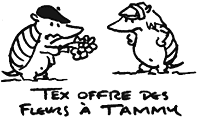
placement
An indirect object pronoun is placed just before the verb of which it is the object. In a composed tense (like the passé composé), the pronoun precedes the auxiliary. In infinitive constructions, the pronoun goes immediately before the infinitive. When the conjugated verb is negative, the ne precedes the object pronoun. Note that, in compound tenses (such as the passé composé), there is no agreement between the past participle and the indirect object. In the affirmative imperative, the indirect object pronoun is placed after the verb it is the object of and attached to it by a hyphen. In addition, me and te become moi and toi.
| Tex: Regarde, quelqu’un m’a envoyé un cadeau. | Tex: Look, someone sent me a gift. | |
| Tammy: Qui t’offre un cadeau? | Tammy: Who is giving you a gift? | |
| Tex ouvre le cadeau. | Tex opens the gift. | |
| Tex: Ahh, une bouteille de champagne! | Tex: Ahh, a bottle of champagne! | |
| Tammy: Oh, regarde. Il y a une petite carte … Bon anniversaire, mon petit tatou. Je compte partager cette bouteille … et la vie avec toi. Avec toi? Mais, il n’y a pas de signature. Eh bien, monsieur, explique-moi! | Tammy: Oh, look. There is a little card … Happy birthday, my little armadillo. I’m counting on sharing this bottle … and life with you. With you? But, there’s no signature. Well, now, sir, explain (this to) me. | |
| Tex: Euh … | Tex: Uh … | |
| Tammy: C’est bien cette petite chatte maline, n’est-ce pas? Je vais aller lui parler. | Tammy: It’s that cunning little cat, isn’t it? I’m going to go talk to her about it. | |
| Tex: Ne lui parle pas! C’est une bagatelle, c’est un petit rien … | Tex: Don’t talk to her! It’s a small thing, it’s nothing … | |
| Tammy: Un petit rien? Paf! | Tammy: Nothing? Pow! |
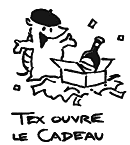
imparfait: formation
The imperfect tense (l’imparfait), one of several past tenses in French, is used to describe states of being and habitual actions in the past. It also has several idiomatic uses.
stem
The stem of the imparfait is the first person plural (nous) form of the present tense, minus the -ons. The imparfait stem is regular for all verbs except être:
| verb | present tense ‘nous’ form |
imparfait stem |
| -er verbs: parler | nous parlons | parl- |
| -ir verbs: finir | nous finissons | finiss- |
| -re verbs: descendre | nous descendons | descend- |
| faire | nous faisons | fais- |
| prendre | nous prenons | pren- |
| partir | nous partons | part- |
| être | nous sommes | ét- |
endings
To the stem, add the endings -ais, –ais, -ait, -ions, -iez, and -aient. Listen carefully to the pronunciation of the verbs danser, finir and être in the imparfait tense. Note that -ais, -ais, -ait, and -aient are all pronounced alike. That means that the singular forms and 3rd person plural (the boot) all sound the same!

| danser ‘to dance’ | |
| je dansais | nous dansions |
| tu dansais | vous dansiez |
| il / elle / on dansait | ils / elles dansaient |
| finir ‘to finish’ | |
| je finissais | nous finissions |
| tu finissais | vous finissiez |
| il / elle / on finissait | ils / elles finissaient |
| être ‘to be’ | |
| j’étais | nous étions |
| tu étais | vous étiez |
| il / elle / on était | ils / elles étaient |
Stem changing verbs like voyager and commencer add an e or ç to maintain the soft g or s sound, before imparfait endings which begin with a (je voyageais, tu voyageais, il / elle / on voyageait, ils / elles voyageaient), in other words, before all forms except nous and vous (nous voyagions, vous voyagiez).
The imparfait of pronominal verbs is regular, with the addition of the reflexive pronoun:
| s’amuser ‘to have fun’ | |
| je m‘amusais | nous nous amusions |
| tu t‘amusais | vous vous amusiez |
| il / elle / on s‘amusait | ils / elles s‘amusaient |
The negation is formed as usual by placing ne … pas around the conjugated verb: Je ne dansais pas (I wasn’t dancing / I didn’t used to dance), Tu ne t’amusais pas (You weren’t having a good time / You didn’t used to have a good time).
Listen to Tex describing his morning:
| Tex: Je suis allé chez Tammy ce matin. Je voulais la voir, mais elle n’était pas chez elle. J’avais un cadeau à lui donner. Je ne pouvais quand même pas le laisser devant sa porte! Donc je l’ai offert à Bette! J’espère qu’elle l’aimera. | Tex: I went to Tammy’s this morning. I wanted to see her, but she was not home. I had a present to give her. I could not really leave it outside her door! So I gave it to Bette! I hope she will like it. | |
| Joe-Bob: Bravo! Quel tombeur tu fais! | Joe-Bob: Bravo! What a Casanova you are! |
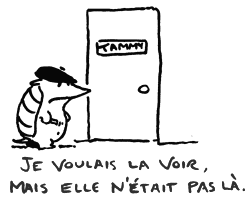
imparfait: states of being, habitual actions
The imperfect tense (l’imparfait) has two primary uses: to describe on-going actions and states of being in the past, and to state habitual actions in the past. The imparfait also has several idiomatic uses. The passé composé and imparfait are each used quite differently in narration.
states of being or past description
The imparfait is used to describe people, places, conditions or situations in the past. Some verbs occur more frequently in the imparfait when they are in the past since they typically describe states of being: être, avoir, vouloir, pouvoir. But these verbs do sometimes occur in the passé composé.
| Quand Edouard était adolescent, il n’avait qu’un rêve – devenir un grand cuisinier. Il voulait créer des chefs-d’oeuvre culinaires. Notre jeune escargot gourmand, qui adorait la cuisine française classique, fréquentait les meilleures tables de Paris. | When Edouard was a teenager, he had only one dream – to become a great chef. He wanted to create culinary masterpieces. Our young food-enthusiast snail, who loved classical French cooking, frequented the best Parisian restaurants. |
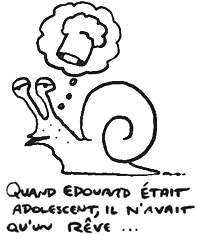
habitual actions in the past
The imparfait is also used to state habitual actions in the past. These past habits are often translated as ‘used to, or ‘would.’ Distinguish between the use of ‘would’ for habitual past actions (imparfait) and the use of ‘would’ for the conditional. Note that the imparfait may also be translated by the simple past in English; however, the context, and often adverbs, let you know the action is a past habit.
Listen to Edouard reminiscing:
| Edouard: Tu te rappelles, en été à Paris, quand il faisait chaud? On allait toujours à 10 heures du soir chez Berthillon … Oh, là, là, leurs glaces, leurs sorbets–fraise, framboise, noisette, pistache, des parfums exotiques. Et puis, on se promenait le long des quais, on voyait la Seine qui coulait, on chantait, on se récitait même des vers. Ah, Paris la nuit, Paris là-bas, mmm, en été. | Edouard: Do you remember, in the summer in Paris, when the weather was hot? We always used to go to Berthillon’s at 10 o’clock in the evening … Oh, la, la, their ice cream, their sorbets–strawberry, raspberry, hazelnut, pistachio, exotic flavors. And then, we would take walks along the quays. We would see the Seine which was flowing. We would sing, we would even recite verses. Ah, Paris in the night, Paris over there, mmm, in the summer. |
imparfait: idiomatic uses
The imperfect tense (l’imparfait) has two primary uses: to describe on-going actions or states of being in the past, and to state habitual actions in the past. The imparfait also has several idiomatic uses found in the following contexts:
suggestions
The imparfait is used to suggest an action in phrases beginning with Si on … ?
| Tammy: Si on achetait une grosse Suburban? | Tammy: What if we bought a big Suburban? (note: ‘on’ is often used in the sense of ‘nous’) |
|
| Tex: Si on achetait une Harley Davidson? | Tex: What about buying a Harley Davidson? |

wishes
The imparfait is used to express wishes such as ‘If only we didn’t have a test this week!’ The French equivalent structure, si + imparfait, may, or may not, contain the adverb seulement:
| Tex: Si (seulement) on avait plus d’argent! | Tex: If (only) we had more money! | |
| Tammy: Ah, si (seulement) mes parents nous prêtaient de l’argent! | Tammy: If only my parents would lend us some money! |
Note that the question mark at the end of the sentence indicates a suggestion, and the exclamation mark a wish. In spoken French, however, you have to rely on context and intonation to distinguish between wish and suggestion. Listen to the difference in intonation between these two sentences:
| Tammy: Si je me faisais tatouer? | Tammy: What if I got tattooed? | |
| Tex: Si seulement je pouvais avoir une moto! | Tex: If only I could have a motorcycle! |
For other uses of si + imparfait, see si clauses + conditional. The imparfait also occurs in idiomatic uses with depuis and venir de.

